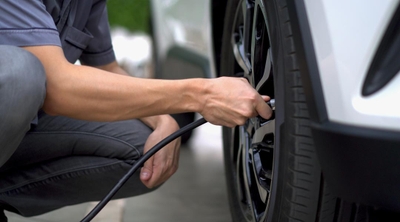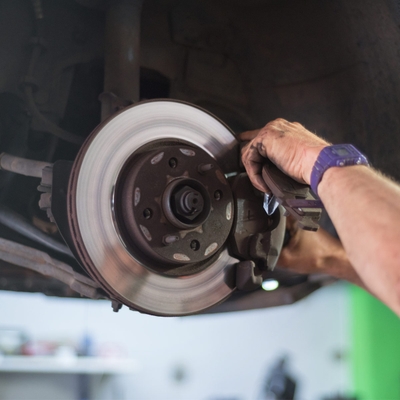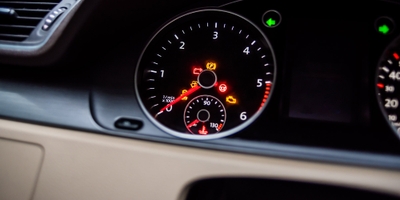Common burning smells in cars
5 min read
Cars produce all sorts of smells — some minor and others more serious. First off, if you notice an unpleasant smell inside your car, like a food spill or pet odor, there’s no need to visit a mechanic. Just find the offending spill and clean it up using a deodorizer.
However, you may encounter a smell caused by your car’s mechanical systems — in particular, when you detect something that smells like something burning. These odors should be taken more seriously, and you may want to seek immediate attention for your car, depending on the issue. Here you’ll find some of the most common car burning smells and how to deal with them.
What does a car burning smell mean?
By and large, any strange smell you notice when you drive your car is probably not good. However, by their nature, burning smells can be indicative of something more destructive.
If you notice a burning smell from the car and it won’t start, this could be a sign of engine damage. Have your car towed to a mechanic, where a professional can inspect the burning smell coming from the engine. Your insurance may even cover the tow if you have roadside assistance on your policy.
Alternatively, you may observe a burning smell from the car when accelerating. Try to identify which type of burning smell it is. Does it smell like burnt plastic, oil, rubber, or electrical components? Each one signifies a different issue with the car, and they should all be taken seriously.
Mechanic Linda Yin of BCS Prestige Auto Service Centre says to be especially careful if you notice smoke coming from your tailpipe or see burning debris or flames coming from the car’s exhaust pipe. She recommends that you stop driving immediately and get your car towed to your nearest repair shop where it can be checked by a certified mechanic right away.
If you car has a more specific burning smell, keep reading to find out what it might indicate.
Car smells like burning rubber
If your car smells like burning rubber, turn off the engine and check under the hood to see if anything looks out of place. Chances are that the burnt rubber smell results from a belt or other part slipping and rubbing against the hot engine. If you can’t identify the problem, take your car to a mechanic.
Car smells like burning plastic
According to experts, a burnt plastic odor could be a sign of worn-out brake pads and is one of the most common causes of a car’s burning smell. Friction can occur when the brake pads or rotors aren’t properly aligned. This friction produces a burning smell. If the problem isn’t addressed, it can cause further friction with the car’s internal wiring. Constant friction over time leads to more serious problems and could even result in an engine fire or explosion. Find a mechanic as soon as possible to have the brake pads inspected and replaced if necessary.
Car smells like burning oil
If your car has a burnt oil smell, this could indicate an oil leak or low oil level. Check the level with a dipstick and look for car leaks around the area. If your oil level is low, schedule an oil change as soon as possible. If you suspect a leak, head straight to a mechanic.
An oil leak can cause serious damage or even an engine fire if not addressed quickly. If there doesn’t seem to be a leak, and the oil level looks right, Yin says the issue could be something as simple as the wrong type of oil. A mechanic can check this for you.
Once you’ve had a mechanic inspect your car, you may still notice a lingering oil smell. Tips on how to get rid of an oil smell in a car include cleaning with soapy water and baking soda, or using cinnamon sticks and orange peels to neutralize the odor.
Car smells like burning electrical
Cars are designed with a variety of electrical elements, including the battery and alternator. If your car smells like burning electrical or like it’s burning under the hood, this could be the cause. If the check engine light comes on while it smells like burning, the spark plugs could be the problem. It can turn dangerous, so get your car straight to a mechanic if you notice any electrical issues under the hood. Learn more about the difference between a car battery and alternator.
Other common car smells
Sour-smelling exhaust: As a car runs, various gases are produced and safely expelled through the exhaust system. If you’re noticing a sour smelling exhaust inside the car, the exhaust system may have a leak. Pull over, turn off the engine, and get your car towed straight to a mechanic. If gases aren’t getting expelled properly, it could cause a dangerous spike in carbon monoxide levels.
Rotten egg smell: A sulfuric smell like rotten eggs likely means there’s something wrong with the catalytic converter, according to Eco Driving USA’s Marketing Manager Dave McCurdy. “Sulfur is a byproduct that the catalytic converter neutralizes and filters out from the exhaust,” he says.
McCurdy recommends that you have your catalytic converter checked and consult a mechanic on whether you should switch fuel brands. A faulty catalytic converter can also cause your check engine light to turn on. If you notice both the check engine light and an engine smell, there’s a good chance this is the issue.
Have a mechanic look at the car as soon as possible. A faulty catalytic converter may mean that your car isn’t street legal, plus the longer you wait, the higher your repair cost is likely to be. Learn more about what car dashboard symbols indicate.
Sweet syrupy scent: You may have a coolant leak if you notice a sweet smell or if your car smells hot, but it’s not overheating. Coolant, also known as antifreeze, keeps the engine at a safe temperature. If there’s a leak and the coolant can’t do its job, the engine may start overheating.
Look under the hood to see if anything appears worn out and remove the radiator cap to check the coolant level. Make sure the engine is turned off and cool before you do this — the cooling system in a car can be extremely hot. If you can’t identify the issue, have a mechanic take a look.
Moldy smell: A car’s air conditioning system pulls moisture from the air. If you don’t use your AC for a long time, that moisture sits stagnant, and mold may grow. Breathing in mold spores can be harmful to your health over time. If you notice a moldy smell, run your AC on full blast for a few minutes to clear things out.
Gas smell: As soon as you notice a gas smell coming from your car, pull over and turn off the engine. First, check your gas cap in case it’s loose. Also, consider your car’s age — if you drive an antique car from the 1970s or earlier, a subtle gas smell can be expected. If the gas cap is on tightly and you drive a more modern vehicle, immediately get the car to a mechanic. A gas leak is dangerous and may cause an engine fire if not addressed. You may consider calling a tow truck to transport your car to the nearest mechanic to be extra safe.
Once you’ve gotten to the bottom of what’s causing that smell in your car, discover common causes for your noisy brakes and find out whether car insurance covers engine repairs.






